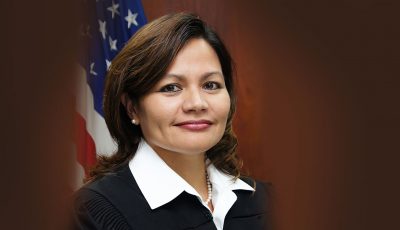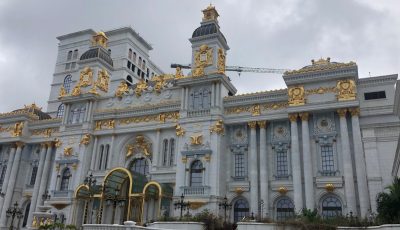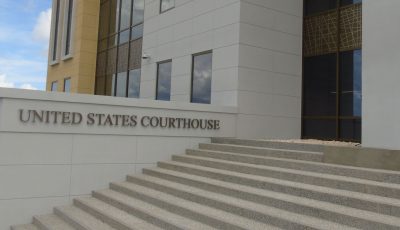They broke the law. Now what?
It’s not often that some of the CNMI’s top elected officials admit to breaking the law they are supposed to uphold. But what is the consequence to now Lt. Gov. Ralph Torres, House Speaker Joseph Deleon Guerrero (Ind-Saipan), and House Vice Speaker Ralph Demapan (R-Saipan) for breaking the Open Government Act in the course of passing the controversial Saipan casino law?
More importantly, where does this leave individual members of the community who have put their trust and faith in their elected officials and the government in general to do the right thing?
Does this have any bearing on the repealed and re-enacted Saipan casino law and the CNMI government’s 40-year casino license agreement with Best Sunshine International, which “promised” a $7.1-billion integrated casino resort on Saipan?
Torres, Deleon Guerrero, and Demapan’s admission last week of law violation as part of a settlement of the lawsuit that private citizen Glen Hunter filed against them raises more questions and concerns.
These are on top of still unanswered questions about what transpired during elected officials’ hush-hush trips to Hong Kong, Macau, Singapore and Manila, and the hasty manner in which the Saipan casino bill passed after those trips.
When ordinary citizens violate laws, they face consequences besides paying a fine. But what if those who admitted to specifically violating the Open Government Act are occupying top elected posts? Does their admission make them liable for prosecution for breaking the law in their official capacity as Senate president, House speaker, and floor leader at the time of Hunter’s filing of a lawsuit against them? Since they are still in top government positions, will there be any reprimand for them?
Hunter sued the three lawmakers, along with other officials or entities that were later dismissed as parties to the lawsuit, over violation of the Open Government Act in passing the Saipan casino bill. The officials failed to meet the required public notices that were supposed to be issued at least 72 hours before the sessions when the bills were passed or the agenda in the public notice failed to include both bills as topics for discussion.
Will the Legislature or the Executive Branch compel the three elected officials to not violate any law again, and uphold laws to the best of their abilities as they always should?
The public can and should “always” demand a more open and more accountable government.
Casino investor Best Sunshine already paid a two-year advance $30-million license fee to restore retirees’ deferred 25-percent pension and the distribution of $10 million utility vouchers last year, among other things, but do these millions of dollars that’s now in the economy compensate for elected officials’ violation of law?
The Saipan casino bill also didn’t go through public hearings and passed the House and Senate only a day apart despite island voters rejecting the proposal twice before. Previous Legislatures also rejected similar bills legalizing casino gaming on Saipan.
Last week, rather than go through sworn depositions surrounding the passage of the Saipan casino legislation, Torres, Deleon Guerrero, and Demapan chose to admit violating the Open Government Act in the passage of Public Laws 18-38 and 18-43 or the original Saipan casino law.
Within months of the Saipan casino law’s passage and after Hunter filed the lawsuit, lawmakers repealed and replaced it with Public Law 18-56. Whether the admission of law violation has any effect on P.L. 18-56 is everyone’s guess at this time.
As part of the settlement agreement, the parties moved to dismiss Hunter’s lawsuit “with prejudice.” This means Hunter, a longtime advocate for a clean, transparent, and accountable government, cannot re-open it anymore. But while Hunter is prohibited from suing the same officials who admitted to violating the law, others can still pursue this or finish what Hunter has started.
Others can file an official Open Government Act request with the Legislature to, among other things, get the specifics on the off-island trips to Hong Kong, Macau, Singapore, and other places, that led to the passage of the Saipan casino law.
The House and Senate rules of procedure require that lawmakers report about their off-island trips during a session but nobody followed their own house rules and no one compelled them to do so in the case of the off-island trips leading to the casino bill passage.
But things have a way of catching up with government officials, and again, questions continue to pile up.
The House and Senate rules of procedures pertaining to off-island travel ought to be amended as soon as possible to give it more teeth, as earlier suggested, such as reporting the specific places where lawmakers will travel, for what specific purpose, who will they be meeting with and the affiliations of those individuals, and who paid for their trip, among other things.
No formal investigation or audit was conducted about those questionable trips by these lawmakers—at least none that was made public. Would the admission of law violation by elected officials change that? Can and will the Office of the Public Auditor and the Office of the Attorney General now investigate or audit those trips?
So far, lawmakers’ seeming response to the law violation admission is to propose to amend the Open Government Act itself, particularly the required 72-hour advance notice for bills.
Meanwhile, proposed changes to the casino license agreement—particularly the addition of a “live” casino training facility—are raising red flags.
Item 19 of the license agreement states in part, “The terms of this License may be modified by mutual written agreement between the Governor and authorized licensee representative.”
To this date, there is no indication or official announcement that the governor (not the Lottery Commission or the Casino Commission) has already agreed to or approved Best Sunshine’s proposal to have a “live” training facility, even though Best Sunshine has already reportedly secured a lease for such a facility.
The casino license agreement also requires the establishment of a “Development Plan Advisory Committee” to, among other things, “provide an established structure for ongoing communication between licensee and the Commonwealth, implementation of licensee development proposal requirements, and implementation schedules.”
Under the casino license agreement, the committee is supposed to provide “weekly reports” on the status of projects, issues of concern and compliance with respective schedules and license requirements. Whether those weekly reports will be available to the public is also anyone’s guess at this time.



























